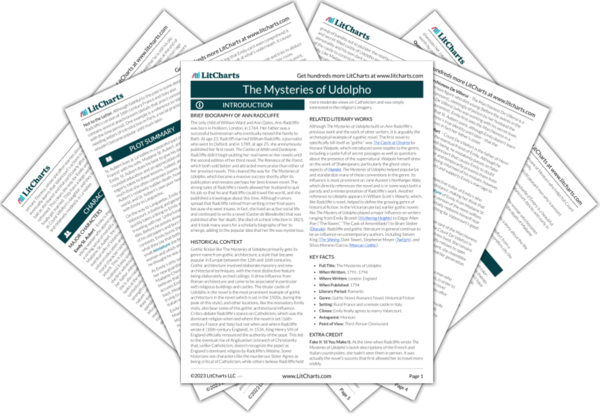The Mysteries of Udolpho contains lavish descriptions of the French and Italian countryside, and the heroic characters take time to appreciate this beauty while the villains tend to lock themselves away from it. Emily, the novel’s protagonist, is often so overwhelmed by the splendor of nature that she can’t help reciting or composing poetry about it. Emily finds that spending time in nature is not just enjoyable but moral—it’s a way to get closer to God and appreciate God’s creations. Nature also plays a social role for Emily, bonding her to people like St. Aubert and Valancourt, who demonstrate their good character by showing how they can appreciate nature.
In contrast, the titular castle of Udolpho is manmade, and so it is framed as the opposite of natural beauty. It is a gloomy place, full of secret passages and ghostly noises, where Montoni locks Emily and Madame Montoni up like prisoners while he plans greedy schemes to take their money. The castle makes Emily long for her youth at La Vallée, where she could wander among the mountains and see rich vegetation. Montoni originally comes from Venice, a city where Emily finds the man-made structures less impressive than the water around the city. Similarly, living in the city seems to cause Montoni to get entangled in corruption, including a prominent assassination. The big city of Paris also has a corrupting effect on Valancourt, who, after moving from the country to the city, loses all his money gambling. These sinfulness of the cities contrasts with the purity and innocence of the natural world. The Mysteries of Udolpho presents nature as a cure to evil schemes and gothic gloom, showing how taking time to appreciate nature’s beauty can make a person not only happier but also more morally upright.
The Wonders of Nature ThemeTracker

The Wonders of Nature Quotes in The Mysteries of Udolpho
On the pleasant banks of the Garonne, in the province of Gascony, stood, in the year 1584, the chateau of Monsieur St. Aubert. From its windows were seen the pastoral landscapes of Guienne and Gascony stretching along the river, gay with luxuriant woods and vine, and plantations of olives. To the south, the view was bounded by the majestic Pyrenees, whose summits, veiled in clouds, or exhibiting awful forms, seen, and lost again, as the partial vapours rolled along, were sometimes barren, and gleamed through the blue tinge of air, and sometimes frowned with forests of gloomy pine, that swept downward to their base.
“How delightful,” said she, “to live amidst the coral bowers and crystal caverns of the ocean, with my sister nymphs, and listen to the sounding waters above, and to the soft shells of the tritons! and then, after sunset, to skim on the surface of the waves round wild rocks and along sequestered shores, where, perhaps, some pensive wanderer comes to weep! Then would I soothe his sorrows with my sweet music, and offer him from a shell some of the delicious fruit that hangs round Neptune’s palace.”
Ludovico, who had been with his tired horses to the hovel, which served for a stable, entered the room, half frantic with joy, in which his auditors soon participated. On removing the saddle from one of the horses, he had found beneath it a small bag, containing, no doubt, the booty of one of the Condottieri, who had returned from a plundering excursion, just before Ludovico left the castle, and whose horse having strayed from the inner court, while his master was engaged in drinking, had brought away the treasure, which the ruffian had considered the reward of his exploit.
And, if the weak hand, that has recorded this tale, has, by its scenes, beguiled the mourner of one hour of sorrow, or, by its moral, taught him to sustain it—the effort, however humble, has not been vain, nor is the writer unrewarded.











